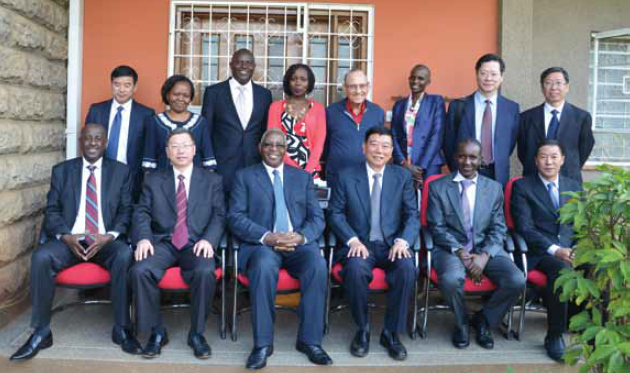|

A China Law Society delegation at the Chartered Institute of Arbitrators, Kenya branch
When Madeline Kimei, Managing Director of Resolution Experts, an arbitration firm in Dar es Salaam, came to China to attend a legal training program this summer, she had no inkling she was going to become part of history. With the China-Africa Joint Arbitration Center (CAJAC) in Johannesburg becoming operational from October, Kimei and other legal practitioners from Africa and China have become part of a pathbreaking initiative to dispense speedy and trust-inspiring mediation.
CAJAC, the first authorized China-Africa arbitration and mediation institution, will address commercial disputes between Chinese and African companies. With trade between the two sides burgeoning and China becoming Africa's largest trading partner, disputes have risen too. Due to language barriers and differences in legal procedures, Chinese enterprises don't feel at home in courts or arbitration centers in Africa and vice versa. The Sino-African nature of CAJAC, and its presence in both Johannesburg and Shanghai, is therefore expected to make it more acceptable to both sides.
Birth of a pioneer
It is a victory for Chinese legal diplomacy in Africa. For decades, Chinese enterprises had been complaining of not receiving justice at European arbitration centers where many Sino-African trade disputes used to land up. Besides, the Chinese Government has been proposing a new joint dispute resolution mechanism in the regions where it has strong commercial relationships. The focus is on a mechanism free of colonial overtones and guided solely by the interests of China and the region.
Finally, prominent Chinese and African legal and arbitral organizations came together this year to support CAJAC. Two consensuses were signed, one in Johannesburg and one in Beijing, to which Kimei was a signatory. They were followed by an agreement signed in August among the Arbitration Foundation of Southern Africa, its international arm Africa ADR, the Association of Arbitrators (Southern Africa), and the Shanghai International Trade Arbitration Center, establishing CAJAC with the support of the signatories to the consensuses. Michael Kuper, head of CAJAC Johannesburg, said it would start accepting cases from October.
The initiative is a fillip for South Africa as well. It comes at a time when Africa has seen a proliferation of arbitration centers, from Cairo (Egypt) and Nairobi (Kenya) to Kigali (Rwanda) and Djibouti. South Africa is also keen to promote itself as an international mediation hub. The government is readying to modernize its international arbitration law and Deputy Minister of Justice and Constitutional Development J.H. Jeffery has said the new International Arbitration Bill will be tabled in parliament this year and probably finalized in early 2016. So setting up CAJAC in Johannesburg is the cherry on the cake.
"CAJAC represents the culmination of a legal diplomatic initiative holding great promise for Africa's further engagement with China," Des Williams, head of Werksmans Attorneys' Arbitration Practice Group and signatory to the Johannesburg consensus, said at its launch. "There have been lengthy and frustrating delays in the establishment of South Africa as an important regional arbitration center. The establishment of CAJAC is a major step in the right direction."
Added value
Other arbitration centers have also hailed the new initiative. "Partnerships between African countries and China on establishing a common dispute resolution is a laudable idea. It has been long overdue," Balla Galma, administrative and research assistant at the Strathmore Dispute Resolution Center in Nairobi, told ChinAfrica. "China's investment in Africa has been increasing. It's only wise that a mechanism is put in place to avert, manage or resolve any disputes that may come of the relationship."
Galma said it would not be a case of too many cooks spoiling the broth. With increased investment in African countries, it was natural that each of these countries would seek to be the one-stop shop for all investor needs. Establishing efficient dispute resolution frameworks is a stride toward that goal.
Also, mainstream dispute resolution - litigation - is overburdened. "There has been an immense backlog of cases within the court system," Galma said. "This has rendered the system slow and inefficient vis-a-vis the need for swift dispute resolution, especially within commercial and financial settings. This has created a demand for an efficient structure outside litigation. Almost all commercial organizations opt for dispute resolution services by these centers."
Tanzanian Madeline Kimei said CAJAC will offer parties a wider choice of forum. "There is also added value in having this joint initiative in place as knowledge and expertise can be shared between [Chinese] and African dispute resolution practitioners," she said.
However, the Johannesburg center may not be enough for Africa. Kimei feels there should be a network of strategically placed branches in other African countries for ease of access to the services. But it would be challenging too as Africa, she said, had inadequate legal regimes and infrastructures for efficient international commercial arbitration. "That is why the branching out has to be done strategically," she suggested.
Chinese legal experts are already lobbying for more centers like CAJAC in other African countries. In August, a delegation from the Beijing-based China Law Society (CLS), an influential organization of Chinese legal academics, discussed a joint China-Africa dispute resolution mechanism with Kenyan arbitration institutions in Nairobi. Kenya has been enthusiastic about the idea, realizing such a Sino-African center, aided by Kenya's geographical position as a gateway to East Africa, could make it the hub of dispute resolution in the region.
According to CLS, Kenya is already planning an East Africa Center for China-Africa Dispute Resolution Center, a China-Africa Legal Center, and a China-Africa Legal Service Center and Research Center.
More developments on CAJAC are expected at the Sixth FOCAC (Forum on China-Africa Cooperation) Legal Forum in Johannesburg scheduled from November 25-27.
sarkarbjreview@outlook.com
|